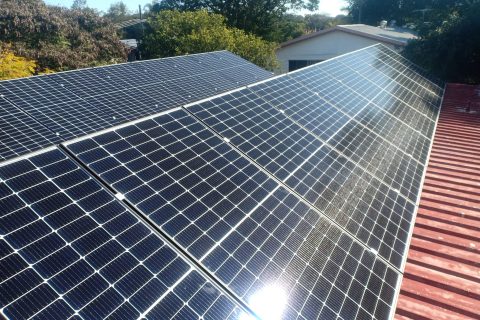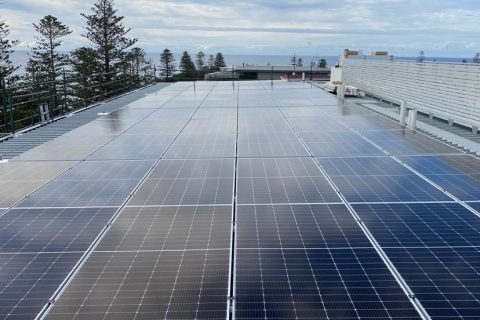Enjoy the savings, in your pocket and for the world. With electricity prices rising and solar costs stabilising, now is a great time to invest in a solar package for your home. It’s not a passing phase, renewable energy is here now and it’s growing faster than ever. We deliver custom designed solution for your specific house, with your specific needs, using Genuine Tier 1 Solar system installed by highly professional expert team of registered CEC Electricians.
ABOUT SOLAR
HOW SOLAR WORKS
Benefits of switching your home energy to solar
- Cost Effective
- Buy reducing household electricity bills, you can save money
- Earn credit by generating energy and sending it back to the grid
- Initial installation costs can be offset by government financial incentives.(Subject to eligibility and approval.)
- Energy sources that are eco-friendly can reduce your environmental impact
- Backup power by installing a battery system
- Clean Energy
- increase your property value
Factors that determine how many solar panels you need
House size doesn’t determine how many solar panels you need! The following are some factors you need to consider when determining how many solar panels you need
-
Energy Usage
Solar panels are more cost-effective the more electricity you use
-
Sunlight in Area
More Solar panels will be required in areas with less sunlight to eliminate electricity bills compared to those in states with more sunlight
-
Panel Wattage
Most solar panels installed today have a power rating of about 390 watts per panel, which means you need fewer panels when you install panels with high wattages
Choosing the right panel
Energy is captured from sunlight by solar panels, which are then converted into electricity. The system is typically referred to as a solar PV system.
The wattage and power level of solar panels vary. It is possible to choose from a wide variety of brands, new technologies and efficiency improvements are introduced frequently and our knowledgeable staff can help you choose the right ones. Despite looking similar, solar panels vary considerably in their power, quality, and reliability. A fully exposed rooftop is ideal for solar.
Solar panels in Australia come with a standard 10 year product warranty and a 25 year performance warranty. It is important to keep in mind that some manufacturers may no longer be in business in 10 or 20 years.
-
Batteries
Rechargeable solar batteries store the ‘excess’ electricity generated from a panel array, boosting energy capacity and making power available for use at night time or on cloudy days.
Recent design improvements and price drops in lithium-ion batteries have made solar storage more viable than ever before.
Assess your energy needs before investing in a battery or batteries. There’s no point buying more capacity than you can use—surplus electricity should instead be fed into the grid for a profit.
If all the appliances in your home are electrical, they can be powered by solar.
Battery storage systems are a serious safety risk if incorrectly installed and may have implications for insurance coverage.
-
Cleaning and Maintenance
To maintain efficiency, panels will need to be cleaned from time to time. If any components are damaged, always contact a trained professional to inspect your system.
-
Inverters
Solar inverters are an essential component of a solar PV system. They convert the direct current (DC) output of solar panels into alternating current (AC) electricity for use in the home.
Inverters can be monitored via a computer program or device app to check energy generation, consumption and correct operation of the system.
Several types of inverter are suitable for home systems.
Solar Systems
There are many different solar systems to choose from depending on your budget, your available roof space, roof pitch, amount of shade, type of roof and what you want from your solar system.
If the available roof space only allows for a small system this may impact the solar systems ability to generate excess solar. In this case, you will be more reliant on consuming the electricity rather than exporting it back to the grid.
If the available roof space allows for larger solar system, you may generate excess solar power and benefit from a feed-in tariff. There are several different systems listed below.
-
6.6 kW Solar System
A 6.6 kW solar system typically has 17-19 solar panels that produce 20-27 kW per day, which is enough to meet the average home’s needs.
- 17 Tier 1 Solar Panels
- CEC Approved 6.6kW Inverter
- WIFI Connectivity
-
8kW Solar System
An 8kW solar system is perfect for large households with higher than average energy expenses.
8kw also ideal for minor commercial use due to its superior power output. Is this large system a match for your home?
- 24 Tier 1 Solar Panels
- CEC Approved 8 kW Inverter
- WIFI Connectivity
-
Inverters
Large residences are best suited for a 10kW solar panel installation.
Owners of electric vehicles or those who intend to purchase one in the future will also benefit from a 10kW system.
- 27 Tier 1 Solar Panels
- CEC Approved 10kW Inverter
- 10kW systems may require a 3-phase power connection due to their ability to export more than 5kw at a time.
- A 10kW solar power system is also well suited for battery backup systems, as it can produce enough power to fully charge a home battery, and provide the home with power.
- WIFI Connectivity
Request a Free Quote
 © Copyright 2023. Privacy PolicyWebsite by Dishy Digital
© Copyright 2023. Privacy PolicyWebsite by Dishy Digital


